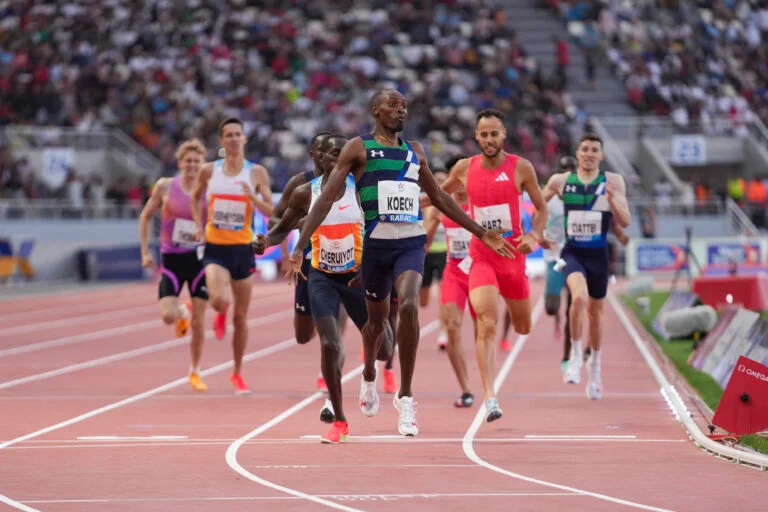
In the storied world of track and field, where margins are measured in hundredths of a second and favorites are forged through years of dominance, upsets are rare — and unforgettable when they occur.
On a balmy evening in Doha, Qatar, in front of a global audience tuning into the 2025 Diamond League opener, American middle-distance runner Jonah Koech defied expectations and delivered one of the most stunning performances in the history of the prestigious series.
A Race No One Expected Him to Win
Koech entered the men’s 800 meters in Doha as a relative underdog. The field was stacked with elite competition: reigning Olympic and World champions, national record holders, and the perennial Diamond League veterans.
The spotlight was firmly fixed on Kenya’s Emmanuel Wanyonyi and Canada’s Marco Arop — two men who had traded world-leading times over the past season. Koech, a 27-year-old runner representing the United States, had no such buzz. Although he was a known name among U.S. track fans, his international résumé lacked the wins or times that would make him a serious threat on paper.
What few remembered, however, was that Koech had been quietly building form. A product of Texas Tech University, Koech had shown glimpses of brilliance in the NCAA system and in domestic races, but had yet to translate that into a global breakthrough. Doha would be different.
A Tactical Masterclass
From the starting gun, the race unfolded predictably — at first. The pacemaker went out hard, setting the tone for a fast race. Arop and Wanyonyi tucked in behind, with the usual pack of contenders jostling for position. Koech, characteristically calm, settled into the middle of the pack, avoiding the early chaos but staying close enough to remain dangerous.
It was the final 200 meters where things took a turn. As the front-runners began to push for home, Koech made a decisive move. Rather than swing wide, he found an opening on the inside — a risky choice in such a tightly packed field. With powerful strides and an unmistakable sense of urgency, he surged forward. In the final 50 meters, he overtook Wanyonyi and edged ahead of Arop, crossing the line in 1:43.47 — a personal best and one of the fastest times ever run by an American.
The stadium erupted in disbelief. Analysts scrambled for context. Koech had not only won — he had dismantled one of the most competitive 800-meter fields assembled in recent memory.
Who Is Jonah Koech?
To understand the magnitude of Koech’s upset, one must look at his journey. Born in Eldoret, Kenya, Koech moved to the United States for college, eventually obtaining U.S. citizenship and committing to Team USA. He trained alongside American distance legend Michael Saruni and was part of the thriving distance community at Texas Tech.
Though talented, Koech’s progress was not linear. Injuries, coaching changes, and the pandemic disrupted key years of his development. While others ascended the global ranks, Koech remained in the shadows — improving, yes, but often overlooked in the increasingly competitive U.S. middle-distance scene.
What makes Koech’s rise even more remarkable is the persistence he’s shown. In an era where athletes often switch coaches or sponsors with each setback, Koech stayed grounded. He kept training. He stayed hungry.
A New Chapter for American Middle-Distance Running
The win was historic not only for Koech personally but for American middle-distance running at large. For years, the U.S. had dominated the sprints and excelled in long-distance events, but the 800 meters remained elusive. Donavan Brazier’s 2019 World Championship win offered a glimpse of hope, but inconsistencies and injuries plagued American performances in the following years.
Koech’s victory in Doha marked a possible shift. He didn’t just win; he ran smart, executed a flawless race plan, and defeated the world’s best on their terms. It was a performance reminiscent of David Rudisha’s tactical awareness and Nijel Amos’s finishing strength — but with an American twist.
Reactions from the Track World
The response was immediate and wide-ranging. Wanyonyi, gracious in defeat, called Koech “the real deal.” Marco Arop, visibly stunned post-race, acknowledged that “Jonah just had another gear today.” U.S. Track & Field officials hailed the victory as a breakthrough moment and a “game-changer” for the upcoming World Championships in Tokyo later this year.
Even fans on social media, notoriously fickle, were unanimous in their praise. Koech trended on X (formerly Twitter) for hours after the race. Memes circulated, celebratory posts poured in, and analysts began re-evaluating their predictions for the rest of the Diamond League season.
What This Means Moving Forward
Koech’s victory is more than just an isolated triumph. It sends a message — to the world, to his competitors, and to himself. He now enters the 2025 season not as an underdog, but as a legitimate contender. There will be expectations, of course. Media scrutiny will increase. But based on how he handled pressure in Doha, there is reason to believe Koech is ready.
His performance also adds complexity to the Team USA selection picture for the World Championships. With runners like Bryce Hoppel, Clayton Murphy, and Donavan Brazier all vying for spots, the competition at the U.S. Trials will be electric — and Koech will now be the man to beat.
A Reminder of What’s Possible
Every sport thrives on moments that defy the expected — the underdog victory, the comeback, the breakthrough. Jonah Koech’s win in Doha was one of those moments. It reminded fans that beyond the headlines and rankings lies the beauty of the sport: anything can happen when the gun goes off.
In a discipline where tactics, timing, and trust in one’s training matter as much as talent, Koech delivered the perfect race at the perfect time. Whether it becomes the start of a dominant run or remains a singular, brilliant moment in Diamond League lore, one thing is clear: Jonah Koech belongs.
Be the first to comment